|
Synopsis
Ebola War: The Nurses of Gulu transports us into the eye of a virulent
epidemic. The power and poignancy of this heroic five month struggle
against a modern day plague is told from the perspective of the
health care workers.
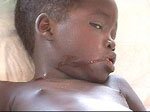 Life
is hard in Gulu. 16 years of civil conflict - then the killing fever.
Without adequate protective gear and training, the nurses were vulnerable.
Four died in the first week. Medical staff were suspected by villagers
of spreading the disease. Distrust was one of many demons nurses
had to battle. Friends turned their backs. Family members begged
them to quit work. They refused. Life
is hard in Gulu. 16 years of civil conflict - then the killing fever.
Without adequate protective gear and training, the nurses were vulnerable.
Four died in the first week. Medical staff were suspected by villagers
of spreading the disease. Distrust was one of many demons nurses
had to battle. Friends turned their backs. Family members begged
them to quit work. They refused.
Ebola kills up to 90% of its victims. Internal organs melt. Bodily
fluids pour from openings. Blood becomes a bomb - that continues
into the grave. The virus stays alive in secretions of the dead
for three days.
The World Health Organization and Centers for Disease Control moved
in. For the first time Canada was asked to join the Global Response
Network Team. Health Canada sent in 3 field epidemiologists.
Despite the odds, the lack of equipment, the death of colleagues,
fear and discrimination – these men and women remained with
their patients until the very end. By the time the disease was spent,
163 people were dead – including 12 nurses and Dr. Matthew
Lukwiya.
Shot on location in isolation wards and villages – the stunning
beauty of Africa collides with terror.
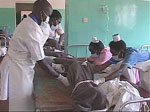 Viewers
see painful reminders of suffering. But,they also experience the
unspeakable joy and exuberance of February 27, 2001 – Ebola
Free Day. Viewers
see painful reminders of suffering. But,they also experience the
unspeakable joy and exuberance of February 27, 2001 – Ebola
Free Day.
Trauma and triumph are explored in gripping eyewitness accounts,
haunting music, unforgettable images and narration delivered by
acclaimed actress, Marina Orsini.
"Ebola War: The Nurses of Gulu" is an intimate and moving
look at the harsh reality of health care workers, the ethical decisions
they face, the sacrifices they make. A timely tale in an age of
new heroes, new dangers.
How
the Show Unfolds
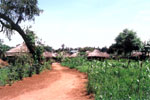 BLOCK
ONE – The documentary opens with the community of
Gulu - celebrating its victory over Ebola. It quickly takes us back
in time to the reality of life in this developing country. The existence
is harsh. Gulu is a community of 300,000 – most poor farmers
from the Acholi tribe. Almost half population is under 25. Few reach
age of 50. There have been 16 years of civil conflict. Then the
epidemic strikes. In the last week of of September cases multiply.
The first two nursing students die. The pace quickens as alarm sets
in with the realization that the outbreak is deadly. The expert,
Dr. Matthew is called in from Kampala. He begins isolating patients.
Fear and confusion are reflected on screen. There are few protectives..
Three weeks after first symptoms - word arrives that blood is Ebola
positive. BLOCK
ONE – The documentary opens with the community of
Gulu - celebrating its victory over Ebola. It quickly takes us back
in time to the reality of life in this developing country. The existence
is harsh. Gulu is a community of 300,000 – most poor farmers
from the Acholi tribe. Almost half population is under 25. Few reach
age of 50. There have been 16 years of civil conflict. Then the
epidemic strikes. In the last week of of September cases multiply.
The first two nursing students die. The pace quickens as alarm sets
in with the realization that the outbreak is deadly. The expert,
Dr. Matthew is called in from Kampala. He begins isolating patients.
Fear and confusion are reflected on screen. There are few protectives..
Three weeks after first symptoms - word arrives that blood is Ebola
positive.
[COMMERCIAL]
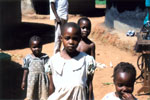 BLOCK
TWO – In this section, we discover more about the
culture of Gulu and how that impacts on the spread of the disease.
Physical contact and interaction are traditionally part of life
- ideal conditions for spreading the disease. We meet Canadian field
epidemiologist Dr. Bonnie Henry for the first time and hear a graphic
portrayal of the disease and hospital conditions."You are walking
on the virus, you are touching the virus, the linens of the patients
are full of the virus." One nurses dies every week. There is
sadness and uncertainty. The hospital becomes a fearful place. The
burial site is restricted. Word comes that help is on the way BLOCK
TWO – In this section, we discover more about the
culture of Gulu and how that impacts on the spread of the disease.
Physical contact and interaction are traditionally part of life
- ideal conditions for spreading the disease. We meet Canadian field
epidemiologist Dr. Bonnie Henry for the first time and hear a graphic
portrayal of the disease and hospital conditions."You are walking
on the virus, you are touching the virus, the linens of the patients
are full of the virus." One nurses dies every week. There is
sadness and uncertainty. The hospital becomes a fearful place. The
burial site is restricted. Word comes that help is on the way
[COMMERCIAL]
 BLOCK
THREE – News of the Ebola outbreak in Gulu spreads.
Villagers panic By now 30 patients have died - in addition to the
nurses. The Global Alert Response Network, a task force of health
professions from Europe and North America arrives in Gulu - bringing
an arsenal of modern medical equipment and supplies. Its mission
is to contain the spread of the virus. They fear it may be too late.
A central lab is set up in St. Mary's Hospital. Members of the (CDC)
Centers for Disease Control oversee the operation. Blood samples
screening takes place round the clock. (WHO) World Health Organization
specialists train the nurses, provide protectives and reassurance.
Misunderstandings continue in community. Family members begin hiding
loved ones suspected of having the virus. A mass education campaign
fans out into the community - identifying potential cases and working
to alleviate suspicion. People fear the hospital - as it is there
family members die. Nurses fear for their own family members. They
begin to isolate themselves. The community bans them from the marketplace. BLOCK
THREE – News of the Ebola outbreak in Gulu spreads.
Villagers panic By now 30 patients have died - in addition to the
nurses. The Global Alert Response Network, a task force of health
professions from Europe and North America arrives in Gulu - bringing
an arsenal of modern medical equipment and supplies. Its mission
is to contain the spread of the virus. They fear it may be too late.
A central lab is set up in St. Mary's Hospital. Members of the (CDC)
Centers for Disease Control oversee the operation. Blood samples
screening takes place round the clock. (WHO) World Health Organization
specialists train the nurses, provide protectives and reassurance.
Misunderstandings continue in community. Family members begin hiding
loved ones suspected of having the virus. A mass education campaign
fans out into the community - identifying potential cases and working
to alleviate suspicion. People fear the hospital - as it is there
family members die. Nurses fear for their own family members. They
begin to isolate themselves. The community bans them from the marketplace.
[COMMERCIAL]
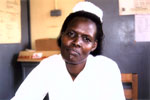 BLOCK
FOUR – Panic in the community continues. Nurses
are shunned. Some of the strongest and most hurtful criticism comes
from colleagues. Nurses threaten to leave the ward. Dr. Matthew
rallies his staff., "You are heroes." They are compared
to battle hardened soldiers. The nurses return to the wards. By
late November the epidemic appears under control. Then disaster
strikes full force. Three medical staff are stricken with Ebola
- among them Dr. Matthew. Through his last night, as he slips in
and out of consciousness, Dr. Matthew reminds staff of their mission,
and encourages them to work hard. He loses his battle against Ebola
on December . He is the last staff member to die from the virus. BLOCK
FOUR – Panic in the community continues. Nurses
are shunned. Some of the strongest and most hurtful criticism comes
from colleagues. Nurses threaten to leave the ward. Dr. Matthew
rallies his staff., "You are heroes." They are compared
to battle hardened soldiers. The nurses return to the wards. By
late November the epidemic appears under control. Then disaster
strikes full force. Three medical staff are stricken with Ebola
- among them Dr. Matthew. Through his last night, as he slips in
and out of consciousness, Dr. Matthew reminds staff of their mission,
and encourages them to work hard. He loses his battle against Ebola
on December . He is the last staff member to die from the virus.
[COMMERCIAL]
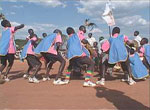 BLOCK
FIVE – Word of what has happened in Gulu is carried
by the international press.. By the end of January all suspected
cases test negative for Ebola. If no cases are confirmed for 21
days, the outbreak will be considered over. Field workers continue
to comb countryside. The 27th of February is declared Ebola Free.
Again our camera takes us to the victory celebration. Thousands
gather at the Gulu football stadium to celebrate. There is music,
dancing and joy. Not to be forgotten as those who died. For them
there is grief displayed at the graveside memorial service. Fiends
and colleagues gather to remember. The program ends with recognition
of what has been accomplished - that there was courage - that they
never quit. BLOCK
FIVE – Word of what has happened in Gulu is carried
by the international press.. By the end of January all suspected
cases test negative for Ebola. If no cases are confirmed for 21
days, the outbreak will be considered over. Field workers continue
to comb countryside. The 27th of February is declared Ebola Free.
Again our camera takes us to the victory celebration. Thousands
gather at the Gulu football stadium to celebrate. There is music,
dancing and joy. Not to be forgotten as those who died. For them
there is grief displayed at the graveside memorial service. Fiends
and colleagues gather to remember. The program ends with recognition
of what has been accomplished - that there was courage - that they
never quit.
|
PRESS RELEASES | FILM
SYNOPSIS | PHOTOS | FILM
CREDITS | MEET THE TEAM |
| ENDORSEMENTS | ABOUT
EBOLA | FURTHER READING |
FUNDED BY | WEB
SITE ©2002 ALETHIA PRODUCTIONS
INC.
WEB SITE DESIGN BY CSI MULTIMEDIA
|


 Life
is hard in Gulu. 16 years of civil conflict - then the killing fever.
Without adequate protective gear and training, the nurses were vulnerable.
Four died in the first week. Medical staff were suspected by villagers
of spreading the disease. Distrust was one of many demons nurses
had to battle. Friends turned their backs. Family members begged
them to quit work. They refused.
Life
is hard in Gulu. 16 years of civil conflict - then the killing fever.
Without adequate protective gear and training, the nurses were vulnerable.
Four died in the first week. Medical staff were suspected by villagers
of spreading the disease. Distrust was one of many demons nurses
had to battle. Friends turned their backs. Family members begged
them to quit work. They refused.
 Viewers
see painful reminders of suffering. But,they also experience the
unspeakable joy and exuberance of February 27, 2001 – Ebola
Free Day.
Viewers
see painful reminders of suffering. But,they also experience the
unspeakable joy and exuberance of February 27, 2001 – Ebola
Free Day.
 BLOCK
ONE – The documentary opens with the community of
Gulu - celebrating its victory over Ebola. It quickly takes us back
in time to the reality of life in this developing country. The existence
is harsh. Gulu is a community of 300,000 – most poor farmers
from the Acholi tribe. Almost half population is under 25. Few reach
age of 50. There have been 16 years of civil conflict. Then the
epidemic strikes. In the last week of of September cases multiply.
The first two nursing students die. The pace quickens as alarm sets
in with the realization that the outbreak is deadly. The expert,
Dr. Matthew is called in from Kampala. He begins isolating patients.
Fear and confusion are reflected on screen. There are few protectives..
Three weeks after first symptoms - word arrives that blood is Ebola
positive.
BLOCK
ONE – The documentary opens with the community of
Gulu - celebrating its victory over Ebola. It quickly takes us back
in time to the reality of life in this developing country. The existence
is harsh. Gulu is a community of 300,000 – most poor farmers
from the Acholi tribe. Almost half population is under 25. Few reach
age of 50. There have been 16 years of civil conflict. Then the
epidemic strikes. In the last week of of September cases multiply.
The first two nursing students die. The pace quickens as alarm sets
in with the realization that the outbreak is deadly. The expert,
Dr. Matthew is called in from Kampala. He begins isolating patients.
Fear and confusion are reflected on screen. There are few protectives..
Three weeks after first symptoms - word arrives that blood is Ebola
positive. BLOCK
TWO – In this section, we discover more about the
culture of Gulu and how that impacts on the spread of the disease.
Physical contact and interaction are traditionally part of life
- ideal conditions for spreading the disease. We meet Canadian field
epidemiologist Dr. Bonnie Henry for the first time and hear a graphic
portrayal of the disease and hospital conditions."You are walking
on the virus, you are touching the virus, the linens of the patients
are full of the virus." One nurses dies every week. There is
sadness and uncertainty. The hospital becomes a fearful place. The
burial site is restricted. Word comes that help is on the way
BLOCK
TWO – In this section, we discover more about the
culture of Gulu and how that impacts on the spread of the disease.
Physical contact and interaction are traditionally part of life
- ideal conditions for spreading the disease. We meet Canadian field
epidemiologist Dr. Bonnie Henry for the first time and hear a graphic
portrayal of the disease and hospital conditions."You are walking
on the virus, you are touching the virus, the linens of the patients
are full of the virus." One nurses dies every week. There is
sadness and uncertainty. The hospital becomes a fearful place. The
burial site is restricted. Word comes that help is on the way BLOCK
THREE – News of the Ebola outbreak in Gulu spreads.
Villagers panic By now 30 patients have died - in addition to the
nurses. The Global Alert Response Network, a task force of health
professions from Europe and North America arrives in Gulu - bringing
an arsenal of modern medical equipment and supplies. Its mission
is to contain the spread of the virus. They fear it may be too late.
A central lab is set up in St. Mary's Hospital. Members of the (CDC)
Centers for Disease Control oversee the operation. Blood samples
screening takes place round the clock. (WHO) World Health Organization
specialists train the nurses, provide protectives and reassurance.
Misunderstandings continue in community. Family members begin hiding
loved ones suspected of having the virus. A mass education campaign
fans out into the community - identifying potential cases and working
to alleviate suspicion. People fear the hospital - as it is there
family members die. Nurses fear for their own family members. They
begin to isolate themselves. The community bans them from the marketplace.
BLOCK
THREE – News of the Ebola outbreak in Gulu spreads.
Villagers panic By now 30 patients have died - in addition to the
nurses. The Global Alert Response Network, a task force of health
professions from Europe and North America arrives in Gulu - bringing
an arsenal of modern medical equipment and supplies. Its mission
is to contain the spread of the virus. They fear it may be too late.
A central lab is set up in St. Mary's Hospital. Members of the (CDC)
Centers for Disease Control oversee the operation. Blood samples
screening takes place round the clock. (WHO) World Health Organization
specialists train the nurses, provide protectives and reassurance.
Misunderstandings continue in community. Family members begin hiding
loved ones suspected of having the virus. A mass education campaign
fans out into the community - identifying potential cases and working
to alleviate suspicion. People fear the hospital - as it is there
family members die. Nurses fear for their own family members. They
begin to isolate themselves. The community bans them from the marketplace. BLOCK
FOUR – Panic in the community continues. Nurses
are shunned. Some of the strongest and most hurtful criticism comes
from colleagues. Nurses threaten to leave the ward. Dr. Matthew
rallies his staff., "You are heroes." They are compared
to battle hardened soldiers. The nurses return to the wards. By
late November the epidemic appears under control. Then disaster
strikes full force. Three medical staff are stricken with Ebola
- among them Dr. Matthew. Through his last night, as he slips in
and out of consciousness, Dr. Matthew reminds staff of their mission,
and encourages them to work hard. He loses his battle against Ebola
on December . He is the last staff member to die from the virus.
BLOCK
FOUR – Panic in the community continues. Nurses
are shunned. Some of the strongest and most hurtful criticism comes
from colleagues. Nurses threaten to leave the ward. Dr. Matthew
rallies his staff., "You are heroes." They are compared
to battle hardened soldiers. The nurses return to the wards. By
late November the epidemic appears under control. Then disaster
strikes full force. Three medical staff are stricken with Ebola
- among them Dr. Matthew. Through his last night, as he slips in
and out of consciousness, Dr. Matthew reminds staff of their mission,
and encourages them to work hard. He loses his battle against Ebola
on December . He is the last staff member to die from the virus. BLOCK
FIVE – Word of what has happened in Gulu is carried
by the international press.. By the end of January all suspected
cases test negative for Ebola. If no cases are confirmed for 21
days, the outbreak will be considered over. Field workers continue
to comb countryside. The 27th of February is declared Ebola Free.
Again our camera takes us to the victory celebration. Thousands
gather at the Gulu football stadium to celebrate. There is music,
dancing and joy. Not to be forgotten as those who died. For them
there is grief displayed at the graveside memorial service. Fiends
and colleagues gather to remember. The program ends with recognition
of what has been accomplished - that there was courage - that they
never quit.
BLOCK
FIVE – Word of what has happened in Gulu is carried
by the international press.. By the end of January all suspected
cases test negative for Ebola. If no cases are confirmed for 21
days, the outbreak will be considered over. Field workers continue
to comb countryside. The 27th of February is declared Ebola Free.
Again our camera takes us to the victory celebration. Thousands
gather at the Gulu football stadium to celebrate. There is music,
dancing and joy. Not to be forgotten as those who died. For them
there is grief displayed at the graveside memorial service. Fiends
and colleagues gather to remember. The program ends with recognition
of what has been accomplished - that there was courage - that they
never quit.